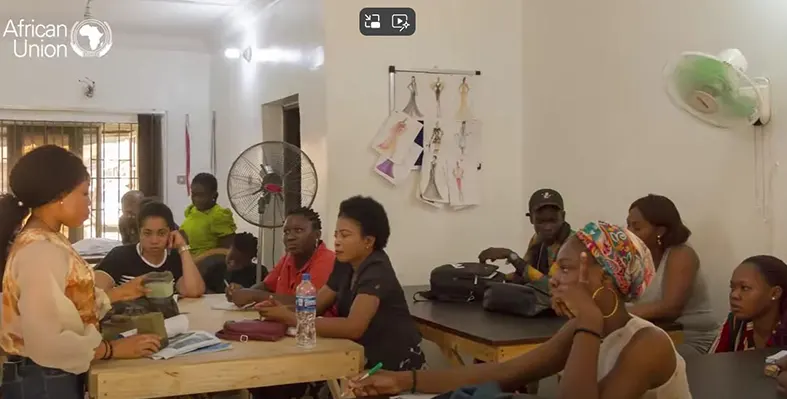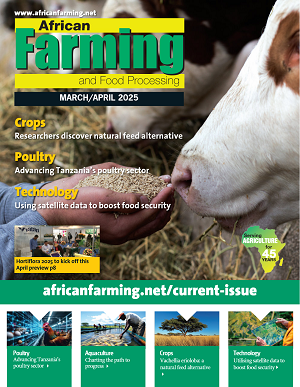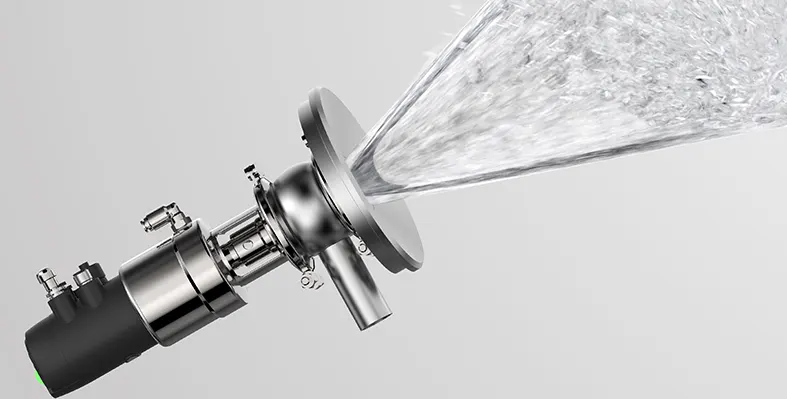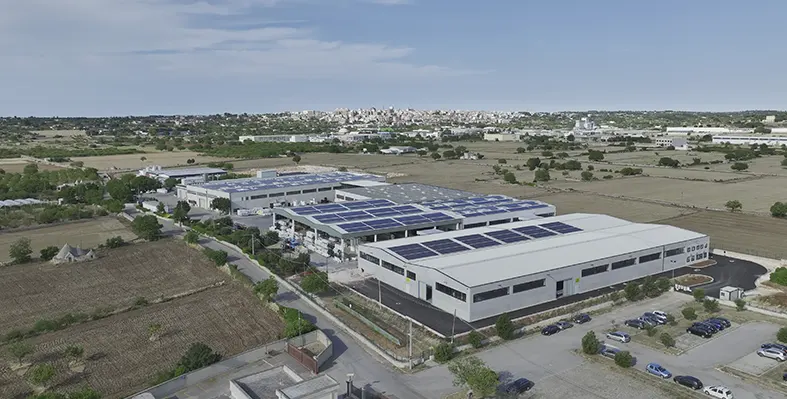In The Spotlight

Eritrea is preparing to become a member of the African Plant Protection Convention. (Image source: Ministry of Information Eritrea)
Eritrea took part in the 19th annual meeting of the Commission on Phytosanitary Measures, held from 17-21 March in Rome
The Commission on Phytosanitary Measures is the governing body of the International Plant Protection Convention, established by member countries to oversee the progress of its subsidiary bodies toward the Convention’s objectives.
Tekleab Misghina, Director General of Regulatory Service at the Ministry of Agriculture, and Asmerom Kidane, Eritrea’s Deputy Permanent Representative at the United Nations Food and Agriculture Organisation, represented the country at the meeting. According to the Public Relations Office of the Ministry of Agriculture, Eritrea is preparing to become a member of the African Plant Protection Convention.
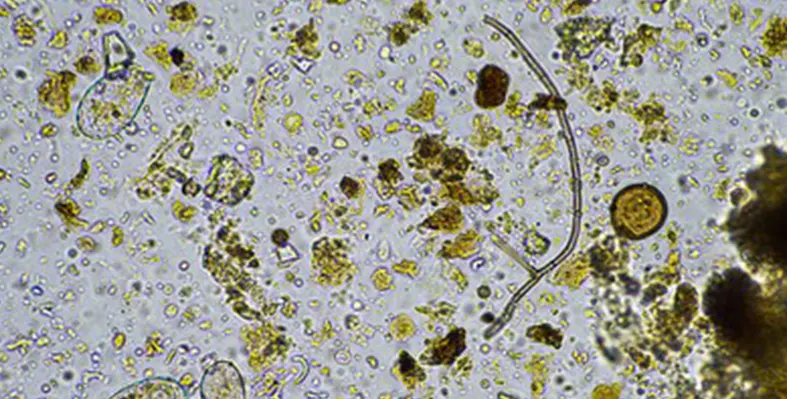
Moa's agreement with NAICONS gives the former exclusive rights to develop any new herbicides discovered in the library. (Image source: Moa Technologies)
Oxford-based agricultural biotech firm, Moa Technology has entered a partnership with Italian natural products company, NAICONS to find a safe, effective and affordable biological herbicide
With over 273 species of weeds that are now resistant to one or more commercially available herbicides, the need for new herbicides has never been more urgent. To date, Moa's platforms have screened almost 800,000 synthetic and naturally-occurring compounds, discovering over 70 potentially novel mode of action herbicides. Three synthetic herbicides with novel modes of action discovered by Moa have already performed strongly in their first two seasons of international field trials.
Moa's agreement with NAICONS gives the former exclusive rights to develop any new herbicides discovered in the library, with value to be shared from future licensing and commercialisation. CEO of Moa Technology, Dr Virginia Corless said the company is looking forward to applying the screening technology to NAICONS' high-quality library of actinomycete bacteria to find out whether a sustainable and effective biological compound can be discovered to assist farmers with controlling weeds.
"We are very excited about this collaboration," said NAICONS CEO, Stefano Donadio. "Our library has never been screened for herbicides and we are confident promising lead molecules will be rapidly identified through our powerful micro4all platform. Over 150,000 different molecules have been identified in the extracts sent to Moa and our team is eager to help in identifying the most promising herbicide candidates."
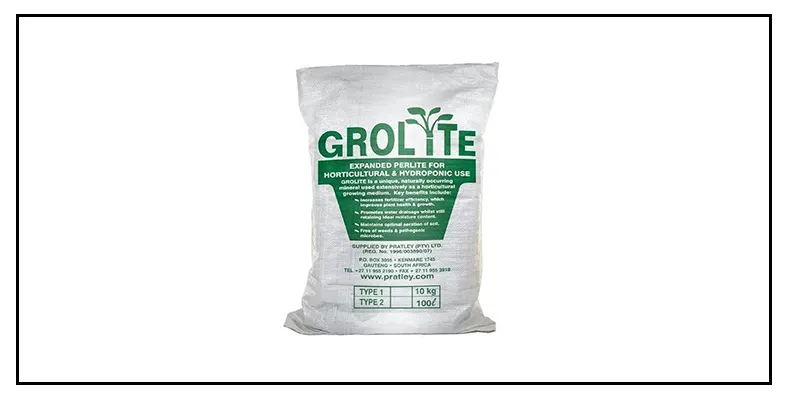
To address productivity challenges, Pratley Group has launched a scientifically designed perlite-based growing medium, Grolite that is known to deliver superior results. (Image source: Pratley)
Grolite, a perlite-based growing medium from Pratley has been known to be a transformative product for farmers, from small-scale enterprises to large agricultural operations
Amidst increasing pressure to boost productivity and efficiency in farming operations, the adoption of innovative solutions has become essential. At the same time, conserving resources is also essential. To address these challenges, Pratley Group has launched a scientifically designed perlite-based growing medium, Grolite that is known to deliver superior results.
Available in Type 1 and Type 2 grades, with sizes ranging from fine to coarse, Grolite accommodates a range of agricultural practices. This flexibility enables farmers to choose the specific grade that best meets their operational needs, whether it is for seedlings, hydroponic systems, soil aeration, or improving moisture retention in crop fields.
Being a sterile growing medium free from any form of harmful pathogens, Grolite provides a clean and healthy environment for plant growth, which is particularly important for the development of fine hair roots. The optimal air-water balance facilitated by Grolite further enhances root systems, leading to faster-growing and more resilientplants. Its excellent wicking properties also promote optimal and uniform water distribution within the growing medium, supporting consistent plant health and productivity.
Grolite's reputation as a durable and consistent growing medium comes from its excellent nutrient intake capability which enables crops to absorb essential nutrients more efficiently. In addition, its inert and stable nature prevents the product from dissolving or degrading over time. Grolite also significantly boosts yield, thanks to its ability to retain fertilisers in the soil, ensuring that nutrients remain available to plants for longer durations.
Furthermore, the product also retains moisture in the soil and maintains stable temperatures, helping crops thrive in South Africa’s diverse and often challenging climatic conditions. Its role in improving soil aeration and drainage prevents compaction and waterlogging, promoting the health and resilience of crops. These properties make it an excellent choice for both traditional farming methods and more advanced systems like hydroponics.
Marketing director, Eldon Kruger highlighted that the benefits of Grolite extend well beyond just enhancing plant growth. "Grolite is more than just a growing medium. It is a strategic resource that empowers farmers to achieve better outcomes whilst also preserving natural resources," stated Krugar.
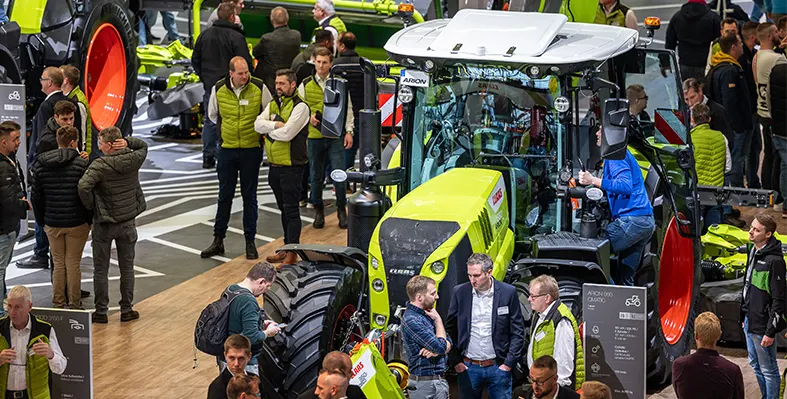
Visitors at Agritechnica 2025 will have the opportunity to explore the current technical possibilities. (Image source: Agritechnica)
This year's Agritechnica 2025 will take place from 9-15 November in Hanover, Germany and will feature advanced, networked agricultural systems in line with the theme 'Touch Smart Efficiency'
Organised by the DLG (German Agricultural Society), the international trade fair will provide farming professionals with direct access to technologies that drive efficiency, sustainability, and productivity in modern agriculture. Conventional agriculture is set to increasingly focus on integrated crop production and crop protection in the future.
Thanks to modern sensor and control technology, the combination of mechanical and chemical crop protection has potential in integrated crop production, as do purely mechanical methods in which the hoeing tools are precisely controlled by cameras - both between and within the rows. In the former case, this enables high working speeds and, in both cases, significant savings in crop protection input. There are also already interesting approaches for optimized control of hoeing units using artificial intelligence (AI).
Mineral fertilisation is also becoming increasingly precise. An important goal here is to minimise nutrient inputs into bodies of water, particularly in the case of nitrogen fertilisation. Other goals are to save on mineral fertilisers through greater precision and increased efficiency. The agricultural machinery manufacturers' answers to these requirements are sensor-supported rate control, further developments in border, automatic part-width section control and variable rate adjustment or systems for adjusting the spreading pattern when cornering. Pneumatic fertiliser spreaders ensure high precision fertiliser application at the field boundary.
Visitors at Agritechnica 2025, will have the opportunity to explore the current technical possibilities and learn how to optimise their application at the booths of numerous exhibitors and through expert forum contributions.
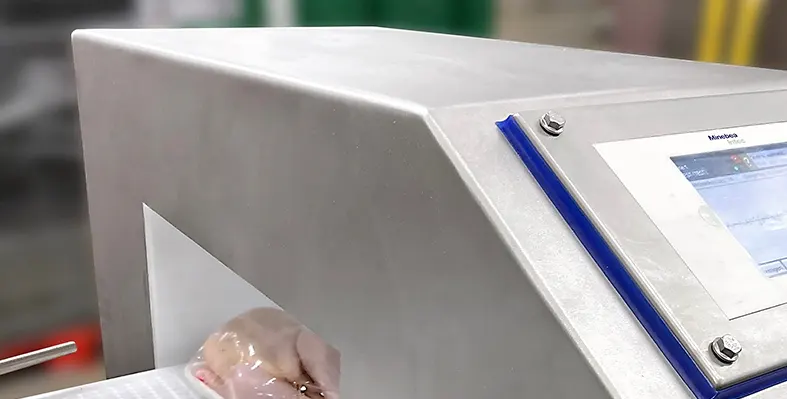
Plukon has worked on minimising false rejections and ensuring the highest levels of metal detection by implementing Mitus from Minebea Intec. (Image source: Minebea Intec)
To address the challenge of metal detection in poultry production, Plukon, a leading player in the poultry supply chain, has implemented the metal detector Mitus from Minebea Intec
Metal detection is a critical aspect of food safety protocols, especially in environments where contamination risks are high. However, traditional metal detectors often struggle to accurately detect metallic foreign objects in poultry products due to their unique electromagnetic properties. This not only causes product wastage, but can also have a major impact on food safety.
To combat these challenges, Plukon has worked on minimising false rejections and ensuring the highest levels of metal detection by implementing Mitus from Minebea Intec. Equipped with MiWave technology, Mitus works by significantly improving detection accuracy and reducing false rejects. By detection even the smallest metallic contaminants with unparalleled accuracy, the technology helps in overcoming the limitations of traditional metal detectors.
Moreover, the new design eases frequent cleaning procedures, which are essential and rigorous in this environment. Mitus also ensures compliance with HACCP standards, providing peace of mind to both Plukon and their customers regarding the safety and quality of their poultry products.
"We’ve faced many challenges with false rejects over the past few years, so I’m really pleased to have these new metal detectors on our lanes," said maintenance manager, Jeroen V. "They not only save us time and reduce costs, but also allow my hardworking team to stay focused on what truly matters.”
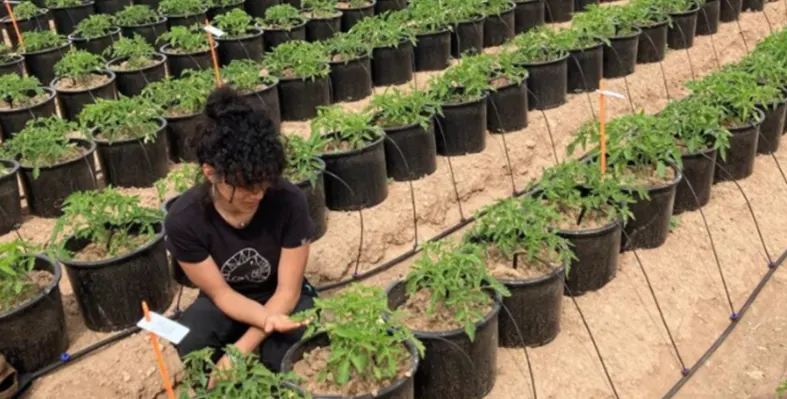
Ifigenia Urbina Barreto, PhD in Ecology and former Biome Makers employee conducting a tomato trial. (Image source: Biome Makers).
Biome Makers and Anglo American have collaborated on a joint research project on the impact of POLY4, Anglo American’s new low-carbon fertiliser, on the soil microbiome
The partnership involves soil trials that analyse and verify the impact of POLY4, Anglo American’s multi-nutrient fertiliser, on soil microbiome composition and functionality through a study on tomatoes and wheat in Spain.
Soil trials have confirmed that with a targeted approach, POLY4 is environmentally friendly and preserves native soil microbiome biodiversity and boosts microbial nutrient mobilisation of potassium (K), calcium (Ca), and chlorine (Cl), improving plant nutrient uptake and development. The research also showed a reduction in soil electrical conductivity, thanks to the activation of calcium and chlorine microbial mobilisation, which further supports healthy soil ecosystems.
“Our collaboration with Anglo American shows our commitment to advancing sustainable agriculture through applied science,” said Dr Alberto Acedo, chief scientific officer of Biome Makers. “By leveraging BeCrop’s proprietary microbiome analysis tools and global soil database, we are able to provide companies like Anglo American with strong evidence of the positive effects of emerging ag input products on soil health.”
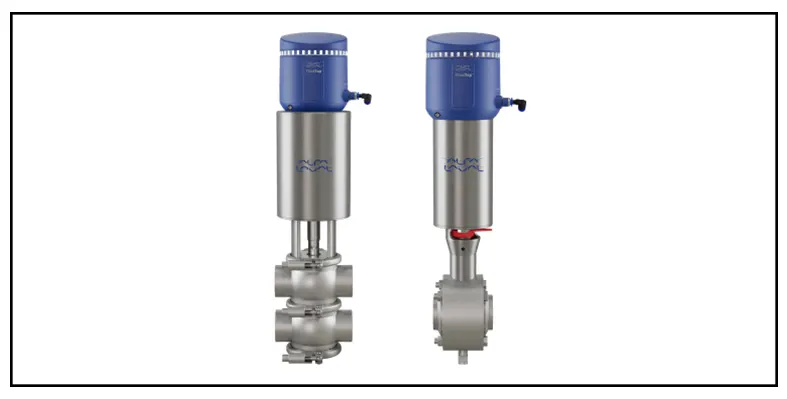
The latest additions to Alfa Laval’s valve portfolio demonstrate their commitment to meeting the evolving needs of industries where safety, efficiency and reliability are paramount. (Image source: Alfa Laval)
Alfa Laval has broadened its range and reaffirmed its commitment to providing reliable, high-performing solutions that ensure safe processing, protect product integrity, and safeguard consumers while addressing the evolving needs of the hygienic industries
The company has introduced the Unique SSV Pressure Relief Valve and the Leakage Detection Butterfly Valve, alongside new smaller sizes of the Unique Mixproof CIP and Unique Mixproof Process valves.
Unique SSV Pressure Relief Valve
When peak performance under pressure is critical, the Unique SSV Pressure Relief Valve protects hygienic processing lines, particularly those with positive displacement pumps, from overpressure. Paired with and powered by Alfa Laval ThinkTop technology for valve monitoring and control, it safeguards process efficiency, productivity and safety. Pressure relief setpoints are easy to adjust onsite to accommodate changing conditions. Built on the proven SSV platform, this modular valve shares spare parts with other Unique SSV valves, simplifying maintenance and reducing service costs. Fully CIP-able regardless of the pressure setting, the valve ensures reliable hygiene and performance while minimising downtime.
Leakage Detection Butterfly Valve
Product safety and efficiency are the hallmarks of this straightforward Leakage Detection Butterfly Valve. When powered by an Alfa Laval ThinkTop for valve monitoring and control, it enhances reliability due to real-time valve monitoring and control. Integrated leakage detection enables rapid response to potential issues, maintaining performance. A single seal, disc and actuator make the valve compact and lightweight while reducing installation, operating, and maintenance costs. Fully CIP-able, the valve guarantees more uptime, continuous operations, long-lasting performance, and energy, water and cleaning media savings.
Alfa Laval is also extending its Unique Mixproof range with two new sizes of the Unique Mixproof CIP and Mixproof Process valves. These smaller double-seat mixproof valves offer high cleanability, pressure resistance, and adaptability to meet diverse hygienic processing needs. With these new sizes, manufacturers can easily integrate more compact CIP skids, valve matrices and dosing lines into hygienic processing lines while maintaining the safety that mixproof valves deliver.
The latest additions to Alfa Laval’s valve portfolio demonstrate their commitment to meeting the evolving needs of industries where safety, efficiency and reliability are paramount. With the Unique SSV Pressure Relief Valve, Leakage Detection Butterfly Valve, and smaller Unique Mixproof CIP and Process Valves, Alfa Laval continues to provide practical, high-quality valves that enhance operational performance across a broad spectrum of applications.




